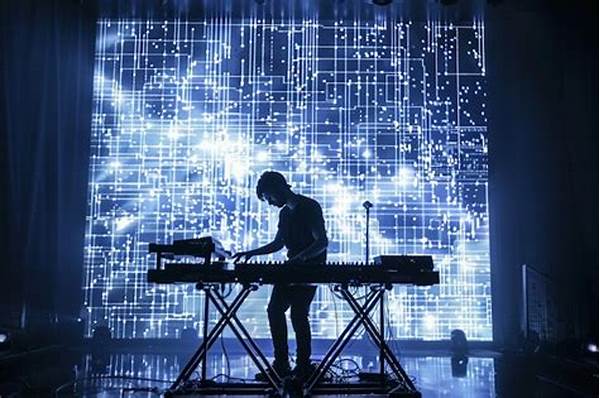Imagine a world where music is no longer bound by traditional instruments. Instead, it is transformed by the electrifying waves of electronic culture—a fusion of innovation, creativity, and the endless possibilities of technology. This remarkable evolution has not only changed the way we create and listen to music but has also revolutionized the very instruments themselves. As music evolves alongside the rise of electronic culture, traditional boundaries are surpassed, and new horizons are discovered.
Read More : Chinese Traditional Music Instrument Yangqin Blending With Symphonies
Welcome to the world where synthesizers sing, DJ decks dance, and digital audio workstations orchestrate symphonies in their unique way. The music scene has never been more exciting and accessible, with artists from all walks of life finding their voice through electronic music. In this article, we’ll dive into the fascinating journey of music instrument evolution, where tradition meets innovation, creating a vibrant tapestry of sound that speaks to both the heart and the mind. Get ready to explore this captivating realm that blends creativity with technology, offering something exclusive for music enthusiasts and tech-savvy individuals alike.
The Digital Revolution in Music
The intersection of electronic culture and music has given birth to an era of unparalleled innovation. The transformation of music instruments began with the advent of computer technology, rapidly propelling music into the digital age. This shift reshaped the industry, leading to an explosion of new genres, styles, and sounds.
Electronic music is now a dominant force in the industry, a testament to the seamless integration of technology with creativity. Influential artists have harnessed electronic instruments to push the boundaries of sound, embracing synthesizers, drum machines, and digital audio workstations (DAWs) as essential tools in their repertoire. The accessibility of these instruments has democratized music production, enabling emerging artists to produce professional-quality tracks from their bedrooms.
Synthesizers: The Pioneers of Change
At the heart of this revolution lies the synthesizer, an iconic instrument that has redefined modern music. Since its inception in the mid-20th century, the synthesizer has evolved dramatically, from bulky analog machines to sleek digital interfaces. Artists across genres have adopted this versatile instrument, from rock legends to electronic pioneers, leveraging its ability to create innovative and experimental sounds. The synthesizer’s distinct tones have embedded themselves in popular culture, inspiring countless hit tracks and providing the backbone for modern electronic music.
DJ Culture: Spinning the Music Industry
DJ culture has played a significant role in the evolution of music instruments alongside the rise of electronic culture. Turntables and mixers, once tools of disco and hip-hop, have transformed into sophisticated digital systems capable of producing intricate soundscapes. With the advancement of CDJs and digital vinyl systems, DJs have elevated their performances, blending tracks seamlessly and effortlessly manipulating sound in real-time.
Music Production: A Technological Symphony
The rise of electronic culture has revolutionized music production, giving rise to the digital audio workstation (DAW)—a powerful software platform that acts as a virtual studio. DAWs like Ableton Live, FL Studio, and Logic Pro have become indispensable tools for music producers, allowing them to compose, arrange, and mix tracks with unmatched precision and flexibility. This accessibility has opened the floodgates for aspiring producers worldwide, making it easier than ever to create, distribute, and share music with a global audience.
The Role of AI and Machine Learning in Music Creation
One of the most exciting developments in music instrument evolution is the integration of artificial intelligence (AI) and machine learning. These technologies enable new levels of creativity and experimentation, giving artists the ability to explore uncharted territories of sound. AI can compose music, generate lyrics, and even adapt performances in real-time, offering musicians novel ways to enhance their creative process.
Read More : Music Instrument Inspiring Cultural Fusion Bands Across Continents
Impact of Music Instrument Evolution on Modern Genres
The evolution of music instruments alongside the rise of electronic culture has birthed entirely new genres, reshaping the musical landscape. From the pulsating beats of EDM to the atmospheric textures of ambient music, electronic instruments have given rise to diverse sonic creations. This transformation has also fostered collaborations between traditional musicians and electronic artists, resulting in groundbreaking hybrid genres that reflect a global fusion of sounds.
Live Performances: A Dynamic Experience
This evolution has breathed new life into live performances, making them immersive and interactive experiences. Artists now incorporate visual effects, interactive installations, and live electronic manipulation to create multisensory shows that captivate audiences. The integration of electronic instruments into live performances has further blurred the lines between genres, allowing musicians to experiment freely and innovate endlessly.
Conclusion: Embracing the Future of Sound
In conclusion, the evolution of music instruments alongside the rise of electronic culture has reshaped the music landscape in remarkable ways. Synthesizers, DAWs, and AI technologies have empowered artists to create, perform, and collaborate like never before, leading to a vibrant and diverse musical ecosystem.
As we look to the future, it’s clear that the synergy between music and technology will continue to drive innovation. Whether you’re a seasoned musician or an aspiring producer, there’s never been a more exciting time to explore the limitless possibilities of electronic music. Embrace this dynamic era, and let your creativity soar to new heights in the world where music and technology harmonize.
